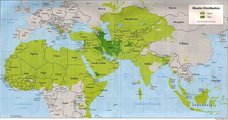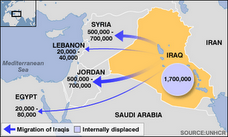 800,000 Internally Displaced Persons
800,000 Internally Displaced PersonsThere are no safe places in Iraq. Militants or insurgents find you wherever you are,” Abdul-Yassin said. “Each time we arrived in a new camp, dozens of other families arrived with us.
Most of the places are full to bursting and some of the displaced families are forced to sleep rough on the ground without tents until aid agencies can give them some protection and food. In the camp where we are staying now, we were forced to sleep in the open air for three days and drink dirty water because the aid agencies couldn’t reach us,” he said.
Contaminated Water
“Displaced families in Anbar, Baghdad, Karbala, Najaf and all the southern provinces are suffering from a shortage of potable water,” a spokesperson for the Iraq Aid Association (IAA) said. “Some are drinking contaminated water and children can be seen nearly starving, requiring urgent water and food.” The UNHCR report confirmed the above, adding that there was an urgent need for shelter, food and non-food supplies, as well as jobs. Aid agencies say they face difficulties accessing IDPs many of whom face severe water shortages.
Unemployment
Unemployment remains the main cause of growing poverty among IDPs, according to Professor Jamal Obeidi, a displacement expert from Baghdad University and an analyst in the Ministry of Displacement and Migration. “If at least one person from each [displaced] family was working, they would have been earning money and been able to buy food for their families, despite the insecurity. The lack of jobs has put these families in the worst conditions,” Obeidi said. Income and employment are reported as priority issues for 65 percent of IDPs, according to the UN-affiliated International Organisation of Migration (IOM).
Lack of Food
Forty seven percent of displaced families in Iraq have no access to the national food programme, according to the country’s Ministry of Trade and the UNHCR. “Lack of security has prevented families getting to warehouses and many others have moved to southern provinces which have been tardy in registering the newly displaced. Some areas cannot cope and lack food to give to the population,” said Maruan Muhannad, a senior official in the Ministry of Trade. Obeidi recommended to the Ministry of Trade that it organise convoys to deliver food parcels directly to IDPs in displacement areas. “They could take the warehoused food which has no owner, fill a convoy and deliver directly to such families.” “Our children are sick because they do not receiving enough food. They are eating badly because we cannot get our share of the national food programme since we got displaced a year ago and have lost our documents,” said May Kareem, 34, a displaced mother of three who lives on the outskirts of the capital. “We cannot get food and cannot leave our place. If the government really wants to help, they could deliver food parcels to us,” she said.
INTERNALLY DISPLACED PERSONS BY LOCATION (ROSE 50% IN 2006)
Northern Provinces 741,900
Central Provinces 450,000
Southern Provinces 716,500
Total 1,908,400
IRAQI REFUGEES
1,200,000 Syria (another 200,000 since these figures were quoted)
750,000 Jordan
100,000 Egypt
54,000 Iran
40,000 Lebanon
10,000 Turkey
200,000 Gulf States
175,000+ Elsewhere in World (Number in US: 6,000)
SOURCE: UNITED NATIONS
IRAQI CIVILIAN DEATHS
65,000 - 70,000
SOURCE: http://www.iraqbodycount.net/database/
Dancewater also reports: "Figures provided by the Lancet study suggest that 50 percent of all violent deaths of Iraqi children under 15 in that same period (March 2003 through June 2006) were due to coalition airstrikes." Since April, 2003, Turse reports, the U.S. has dropped at least 59,787 pounds of cluster bombs in Iraq, a type of weapon Human Rights Watch(HRW) termed "the single greatest risk civilians face with regard to a current weapon that is in use."
Addition: This is a summary of what was said by UNHCR spokesperson Jennifer Pagonis – to whom quoted text may be attributed – at the press briefing, on 5 June 2007, at the Palais des Nations in Geneva.
The situation in Iraq continues to worsen, with more than 2 million Iraqis now believed to be displaced inside Iraq and another 2.2 million sheltering in neighbouring states. Calls for increased international support for governments in the region have so far brought few results, and access to social services for Iraqis remains limited. Most of the burden is being carried by Jordan and Syria.
Inside Iraq, some 85 percent of the displaced are in the central and southern regions. Most of those displaced are from Baghdad and surrounding districts. Since February last year, an estimated 820,000 people have been displaced, including 15,000 Palestinians who have nowhere to go.
Individual governorates inside Iraq are becoming overwhelmed by the needs of the displaced. At least 10 out of the 18 governorates have closed their borders or are restricting access to new arrivals. UNHCR is receiving disturbing reports of regional authorities refusing to register new arrivals, including single women, and denying access to government services. Many displaced have been evicted from public buildings. Combined with the general lack of resources, this has led to a growing number of impoverished shanty towns. The UN Assistance Mission in Iraq (UNAMI) and WFP indicate that at least 47 percent of the displaced have no access to official food distribution channels.
The number of Iraqis fleeing to neighbouring countries remains high. According to government figures, some 1.4 million Iraqis are now displaced in Syria, up to 750,000 in Jordan, 80,000 in Egypt and some 200,000 in the Gulf region. Syria alone receives a minimum of 30,000 Iraqis a month.
Recognition rates of Iraqis in various countries outside the region, particularly in Europe, remain low. UNHCR repeats its call for all borders to remain open to those in need of protection.
UNHCR is rapidly expanding its operations and presence in the region, but the magnitude of the crisis is staggering. We now have 300 staff working full time on Iraqi displacement. They are based in Syria, Jordan, Lebanon, Turkey, Geneva and in Iraq itself. Since the beginning of the year, our offices in surrounding countries have registered more than 130,000 Iraqi refugees. By the end of May, UNHCR had interviewed some 7,000 of the most vulnerable Iraqis and sent their dossiers to potential resettlement countries for their further assessment and action. We urge these countries to make rapid decisions and facilitate the departure of those most in need. Resettlement, however, remains an option for only a few of the most vulnerable Iraqis. Our goal is to provide up to 20,000 Iraqi resettlement cases to governments this year.
Analysis of detailed statistics show that in Syria alone, about 47,000 of the 88,447 refugees registered since the beginning of this year are in need of special assistance. About a quarter of them require legal or protection assistance, including many victims of torture. Nearly 19 percent have serious medical conditions. UNHCR has opened two community outreach centres in Damascus and will shortly open two more. Food and medical aid is being provided to the most vulnerable. We are also working with an increasing number of local and international partners who are helping with health, education, counselling and vocational training.
Two international UNHCR staff are working in Erbil and another is scheduled to go to Baghdad when the security situation permits. These international staff are reinforcing more than 20 local UNHCR staff in seven locations in Iraq. Our goal is to provide basic assistance and shelter to some 300,000 uprooted Iraqis inside the country by the end of this year. This, however, is just a fraction of the overall needs. UNHCR legal aid centres in 18 governorates have provided advice to over 10,700 displaced Iraqis. By the end of 2007 we also plan to provide essential medical/health, food and individual assistance to 50,000 of the most vulnerable Iraqis in neighbouring countries.





No comments:
Post a Comment